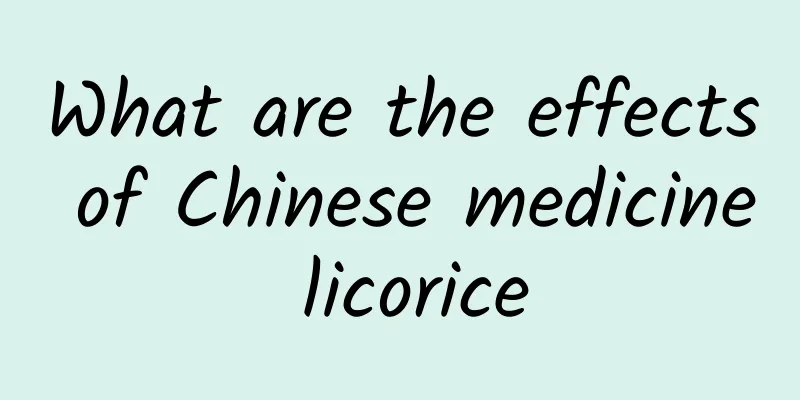What are the effects of Chinese medicine licorice

|
Licorice is very common in our daily life and is often used, especially in the summer. It is very effective in removing heat, detoxifying, nourishing the spleen and replenishing qi. It can stimulate appetite and increase appetite. The immune molecules contained in licorice can enhance immune function and have anti-inflammatory effects. It can relieve cough and reduce phlegm, fight against inflammation such as sore throat, act on the gastrointestinal tract, and is beneficial for the treatment and prevention of gastrointestinal inflammation and ulcers. This medicine mainly plays a neutralizing role and is usually combined with other medicines. It can also be used for tea or made into health-preserving soup. 1. Adrenal cortex hormone-like effects: Licorice extract, glycyrrhizin, and glycyrrhetinic acid have deoxycorticosterone-like effects on a variety of animals, which can promote sodium and water retention, increase potassium excretion, and show mineralocorticoid-like effects; Licorice extract and glycyrrhizin can cause thymus atrophy, increase adrenal gland weight, decrease eosinophils and lymphocytes in the blood, and increase free 17-hydroxycorticosterone in the urine in rats, showing glucocorticoid-like effects. 2. Regulate the body's immune function: Licorice has different ingredients that enhance and inhibit the body's immune function. Licorice glucan can enhance the body's immune function, activate and proliferate mouse spleen lymphocytes, exhibit mitogenic properties, and have a synergistic effect when used in combination with ConA. 3. Antibacterial, antiviral, anti-inflammatory and anti-allergic: Licorice flavonoids have inhibitory effects on Staphylococcus aureus, Bacillus subtilis, yeast, fungi, streptococci, etc. Glycyrrhizin has a significant inhibitory effect on human immunodeficiency virus (HIV), hepatitis virus, vesicular oral virus, adenovirus type III, herpes simplex virus type I, vaccinia virus, etc. Licorice has a corticosteroid-like anti-inflammatory effect, and has inhibitory effects on chemical ear swelling in mice, increased permeability of abdominal capillaries, cotton ball granuloma in rats, formaldehyde-induced rat foot swelling, and carrageenan-induced rat arthritis. Licorice has many benefits for the human body, but excessive use can be harmful. The chemicals in licorice can promote the excretion of potassium ions in the body, leading to hypokalemia, which damages heart function. Because it is not diuretic, it can cause edema, etc. Therefore, patients with diabetes, kidney disease, and heart disease are advised not to use it. It is best to consult a doctor before use to see if it is suitable. |
<<: What are the effects of Chinese medicine dried ginger
>>: What are the effects of Chinese medicine beehive
Recommend
Facial recognition has become a reality. Have you been recognized?
Do you still remember these plots in the movies? ...
What is marijuana?
Marijuana is mainly a common herb and has a very ...
Are mushrooms plants? No, they are macrofungi!
Speaking of fungi, some people may say that they ...
The sourest species, its butt can spray vinegar!
As the most prominent members of the Arachnida, s...
How much basic knowledge do you know about our home planet?
This article is based on answering similar questi...
The medicinal effects of Illicium thornyum
Holly is also known as bird's nest, cat's...
The efficacy and function of empty barrel ginseng
Ginseng odoratum is a very common Chinese medicin...
Ephedra Root Side Effects
Ephedra root has significant effects in treating ...
Side effects of Acorus calamus
Medicine is very common in life. Different medici...
A 16-year-old girl got pregnant and was infected with AIDS. Can the disease be seen from the outside? What is the only way to find out the infection?
Xiaoying, 16, got pregnant unexpectedly right aft...
Recognize noise with a discerning eye and draw it!
What is noise? Whatever you think it is. Noise is...
The efficacy and function of eucalyptus
Eucalyptus truncatum is very familiar to everyone...
The role and use of cat's eye grass
Chinese herbal medicine is a treasure of wisdom p...









